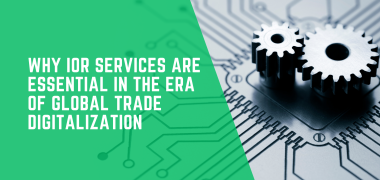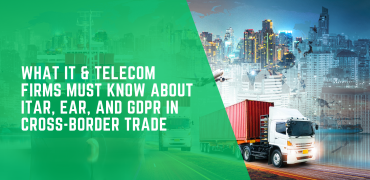The rapid pace of global trade digitalization has fundamentally transformed the way businesses operate across borders. E-commerce growth, advanced supply chain technologies, and evolving trade regulations have made international trade more accessible yet increasingly complex. In this landscape, Importer of Record (IOR) services have emerged as indispensable for businesses seeking seamless and compliant global trade operations.
What Are IOR Services?
The Importer of Record (IOR) is the entity legally responsible for ensuring compliance with customs regulations, paying import duties and taxes, and maintaining proper documentation for goods entering a country. IOR services provide a comprehensive solution for businesses, particularly those without a local presence in the target market, to navigate the complexities of international trade.
The Impact of Global Trade Digitalization
The digitalization of global trade has introduced several advancements:
- Enhanced Connectivity
- Real-time communication and data sharing across borders enable businesses to streamline their operations.
- Automated Processes
- Automation in customs clearance, inventory management, and logistics reduces errors and improves efficiency.
- Increased Transparency
- Digital tools like blockchain enhance traceability, ensuring ethical sourcing and adherence to regulatory standards.
- Regulatory Complexity
- As trade evolves, so do customs regulations. Businesses must navigate an ever-changing landscape of compliance requirements.
These advancements, while beneficial, introduce challenges that make IOR services critical for businesses engaging in international trade.
Why IOR Services Are Essential in the Digital Era
1. Ensuring Regulatory Compliance
Every country has its own set of import regulations, which can be intricate and frequently updated. Non-compliance can lead to fines, delays, and reputational damage. IOR service providers have expertise in:
- Navigating country-specific regulations.
- Ensuring accurate classification of goods.
- Handling necessary documentation, such as commercial invoices, certificates of origin, and packing lists.
2. Simplifying Cross-Border Operations
For businesses without a physical presence in the destination country, managing imports can be daunting. IOR services act as a local representative, taking on responsibilities such as:
- Acting as the legal importer for customs purposes.
- Managing tax and duty payments.
- Coordinating with freight forwarders and customs brokers.
This simplifies the process for businesses, allowing them to focus on core operations.
3. Supporting E-Commerce Expansion
The e-commerce boom has driven a surge in cross-border trade. Businesses selling online face unique challenges, such as:
- Handling a high volume of low-value shipments.
- Meeting delivery expectations for speed and transparency.
IOR services streamline these operations by:
- Managing bulk imports for e-commerce fulfillment centers.
- Ensuring compliance with destination country regulations, such as VAT and GST requirements.
4. Mitigating Risks
Global trade involves numerous risks, from shipment delays to regulatory penalties. IOR service providers mitigate these risks by:
- Offering insurance options for goods in transit.
- Ensuring adherence to trade agreements and embargoes.
- Providing audit support to address compliance issues.
5. Facilitating Technology Imports
The importation of technology products, such as IT equipment and telecommunications devices, requires additional compliance measures, including certifications and licenses. IOR services are particularly valuable for:
- Managing compliance with technical standards, such as CE marking in the EU or FCC approval in the U.S.
- Handling restricted or dual-use items subject to export control regulations.
Key Features of Effective IOR Services
- Global Coverage
- A reliable IOR service provider offers support in multiple countries, enabling businesses to scale their operations seamlessly.
- Regulatory Expertise
- Providers must stay updated on trade policies, tariffs, and customs procedures to ensure compliance.
- Technology Integration
- Advanced IOR services leverage digital platforms for real-time tracking, documentation management, and reporting.
- Customizable Solutions
- Businesses have unique needs; flexible IOR solutions cater to specific industries, shipment volumes, and product types.
Industries That Benefit from IOR Services
1. Technology
Companies importing IT equipment, software, and electronics often face stringent regulatory requirements. IOR services ensure smooth customs clearance and compliance with technical standards.
2. Healthcare
Medical devices, pharmaceuticals, and other healthcare products require precise handling and adherence to strict regulations. IOR providers manage these complexities effectively.
3. Retail and E-Commerce
IOR services enable retailers and e-commerce businesses to expand globally by simplifying bulk imports and ensuring timely deliveries.
4. Manufacturing
Manufacturers importing raw materials or machinery benefit from IOR services to ensure uninterrupted production schedules.
Case Studies: IOR Success Stories
1. Tech Company Expanding in Asia
A U.S.-based tech company sought to expand its operations in Asia. However, the importation of IT equipment into multiple countries posed regulatory challenges. By partnering with an IOR service provider, the company:
- Achieved compliance with local import regulations.
- Avoided delays in customs clearance.
- Streamlined its operations across multiple Asian markets.
2. E-Commerce Giant’s Cross-Border Success
A global e-commerce platform aimed to enhance its presence in Europe. The IOR provider facilitated:
- Bulk imports for fulfillment centers.
- Compliance with EU VAT regulations.
- Faster delivery times, improving customer satisfaction.
Challenges in Implementing IOR Services
Despite their benefits, implementing IOR services comes with challenges:
- Cost
- IOR services involve fees, which may be significant for small businesses.
- Finding a Reliable Provider
- Not all providers offer the same level of expertise or global coverage. Businesses must conduct due diligence.
- Integration with Existing Systems
- Businesses may face challenges integrating IOR services with their supply chain and IT systems.
The Future of IOR Services
The demand for IOR services is set to grow as global trade digitalization accelerates. Key trends shaping the future include:
- AI and Automation
- AI-powered tools will enhance documentation accuracy, reduce processing times, and predict compliance risks.
- Blockchain Integration
- Blockchain will improve transparency and traceability in the import process, ensuring data integrity.
- Sustainability Initiatives
- IOR providers will play a role in supporting businesses’ sustainability goals by ensuring compliance with environmental regulations.
- Expansion to Emerging Markets
- As emerging markets become more accessible, IOR services will enable businesses to tap into new opportunities.
Conclusion
In the era of global trade digitalization, IOR services are no longer optional but essential for businesses seeking to navigate the complexities of international trade. By ensuring compliance, mitigating risks, and simplifying operations, IOR providers empower businesses to expand their global footprint. As technology and trade continue to evolve, the role of IOR services will become even more critical in fostering seamless and compliant global commerce.




